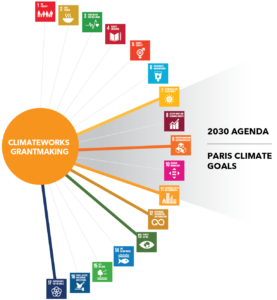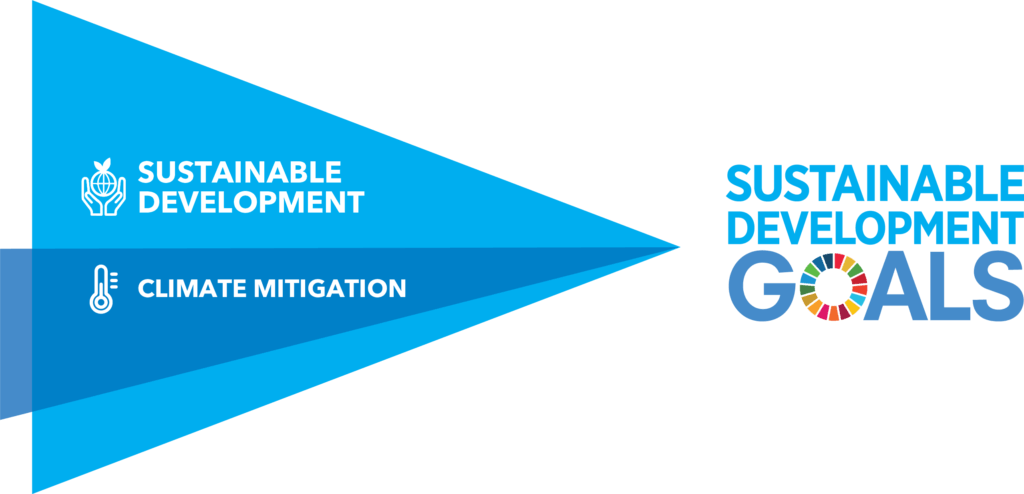Prosperity for All: How Climate Change Mitigation Grantmaking Supports Sustainable Development
Prosperity for All: How Climate Change Mitigation Grantmaking Supports Sustainable Development
By Lina Fedirko, Casey Cronin, and Colin Kelly
In late 2018, ClimateWorks began to examine how philanthropic grantmaking focused on climate change mitigation connects with sustainable development, in order to understand how our work can have a wider impact beyond climate. ClimateWorks conducted an internal assessment of 400+ grants and contracts awarded by 14 portfolios and initiatives between 2017-2019 to determine linkages with the 17 Sustainable Development Goals (SDGs). Our assessment showed that all grants and initiatives aligned with at least one SDG in terms of direct and/or secondary intended outcomes, amounting to roughly $117.6 million between January 1, 2017 to May 31, 2019. This revealed the clear and strong linkages between climate action and sustainable development in advance of the comprehensive review of progress on the 2030 Agenda for Sustainable Development and the SDGs on September 24-25 in New York.
Our latest strategy brief compiles our findings and highlights three key takeaways for ClimateWorks and the wider philanthropic community:

- STRONG ALIGNMENT ACROSS SDGs: The vast majority of grants align with at least one SDG. The complexities of the connections are illustrated throughout the strategy brief, and particularly through three specific case studies.
- MITIGATION ADVANCES THE 2030 AGENDA: ClimateWorks’ mitigation initiatives collectively advance the broader 2030 Agenda, with linkages between portfolio initiatives and all of the SDGs.
- SIX SDGs ARE PILLARS OF A MITIGATION STRATEGY: The core of ClimateWorks’ global grantmaking is closely aligned to six SDGs: Goal 7 on Clean Energy; Goal 9 on Industry, Innovation, and Infrastructure; Goal 11 on Sustainable Cities; Goal 12 on Sustainable Consumption and Production; Goal 13 on Climate Action; and Goal 17 on Partnerships for the Goals.
In this strategy brief, we provide an overview of the alignment between ClimateWorks portfolios and the SDGs, as well as in-depth case studies on three specific portfolios. We found that:
- ClimateWorks Forests and Land Use grantmaking led by the Climate and Land Use Alliance advances Goal 1 on No Poverty and Goal 10 on Reducing Inequality, among others.
- The Kigali Cooling Efficiency Program leads work that connects cooling with Goal 2 on Zero Hunger and Goal 14 on Life Below Water, among others.
- ClimateWorks’ Transportation portfolio supports Goal 7 on Clean Energy and Goal 9 for Industry, Innovation, and Infrastructure, among others.
Lastly, we identified four significant actions philanthropy can take over the next decade in the light of this assessment and the strong linkages between climate mitigation and sustainable development:
-
LEVERAGE the language, goals, and targets of the SDGs to connect climate issues with development opportunities and pursue new partnerships that prioritize pathways to sustainable development that is supported by climate action.
-
When exploring sectors and geographies that are new to ClimateWorks, we now seek to determine how relevant governments and stakeholders view the SDGs in relation to national economic development priorities. In areas where specific SDGs are politically salient and aligned with Paris climate goals, there is a stronger strategic case for philanthropic investment.
-
When it comes to mobilizing climate philanthropy – including by engaging funders that are new to climate but perhaps not to development – we are seeking to build new partnerships to drive investments in areas that advance shared goals. For example, the Health and Climate Fast Start Fund aimed to seed promising solutions to improve air quality, decarbonize the health sector, promote health equity, and mobilize grassroots responses to climate change from within the health community.
-
Since its earliest stages, climate philanthropy has sought to reduce air pollution, which in turn promotes climate-friendly transportation and power systems, while also benefitting human health. Going forward, we will continue to explore other goals and targets within the SDGs that have significant potential to drive climate change mitigation.
-
-
SUPPORT and develop research into future energy, transportation, and land-use systems that deliver on the SDGs in a way that is complimentary to climate action, to achieve a safe climate and a prosperous future, consistent with both the 2030 Agenda and the Paris Agreement’s long-term goals.
-
In addition to providing funders with information about the climate change mitigation potential of different initiatives, the ClimateWorks Advisory and Research team now produces SDG overlays to give funders wider context around philanthropic opportunities.
-
In terms of research products that ClimateWorks supports, we are now asking partners to include consideration of the SDGs in their analysis. For example, in issuing country-specific recommendations for climate action, Climate Transparency noted how various actions can support achievement of particular SDGs.
-
-
COMMUNICATE more thoroughly about the impacts of climate action on sustainable development, including within theories of change, program goals, outcomes, key performance indicators, etc.
-
For ClimateWorks, this publication is an initial step in this direction.
-
Because of the nature of its mission, a large portion of the Kigali Cooling Efficiency Program’s communications relate to sustainable development and the centrality of cooling to human health and prosperity as the world urbanizes, economies grow, and the climate crisis intensifies. This can serve as a model for other ClimateWorks portfolios.
-
-
TUNE IN over time, to opportunities to embed sustainable development priorities into climate programs, and vice versa.
-
We welcome feedback and suggestions from partners on how ClimateWorks can better accomplish this.
-
ClimateWorks seeks to partner with others to embed sustainable development in climate change mitigation, and vice versa.
-
Finally, it is important to note that every fraction of a degree of global warming will amplify the range of associated climate impacts, which will make sustainable development more difficult and costly to achieve. Developing countries are expected to suffer disproportionately from temperature rises, with the poorest most heavily affected. Progress on climate change mitigation can thus be an important enabler of the sustainable development agenda for the regions and populations that need it most. ClimateWorks believes the work on climate mitigation by our partners and the philanthropic community is crucial in stabilizing a safe climate and ensuring a prosperous future for all.
For readers with further questions, please contact advisory@climateworks.org for more detailed information.

